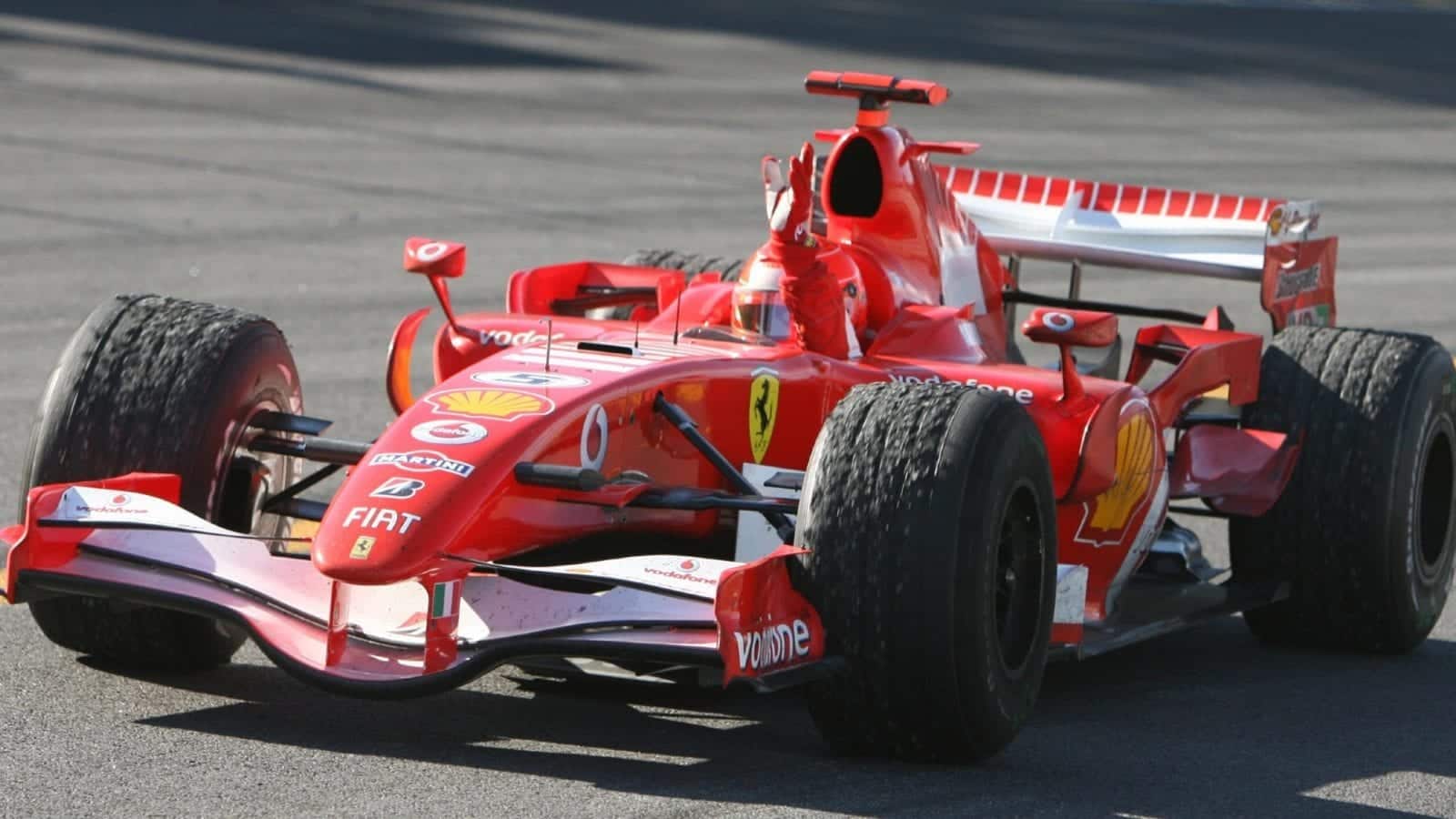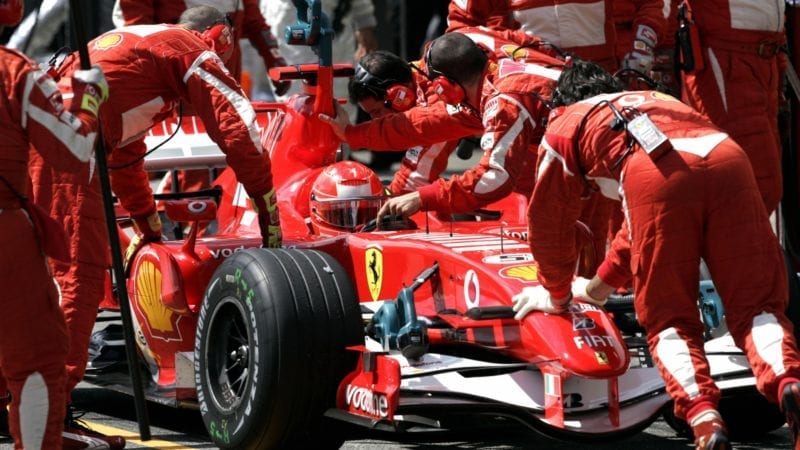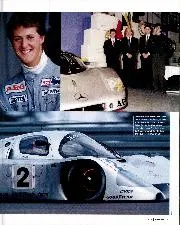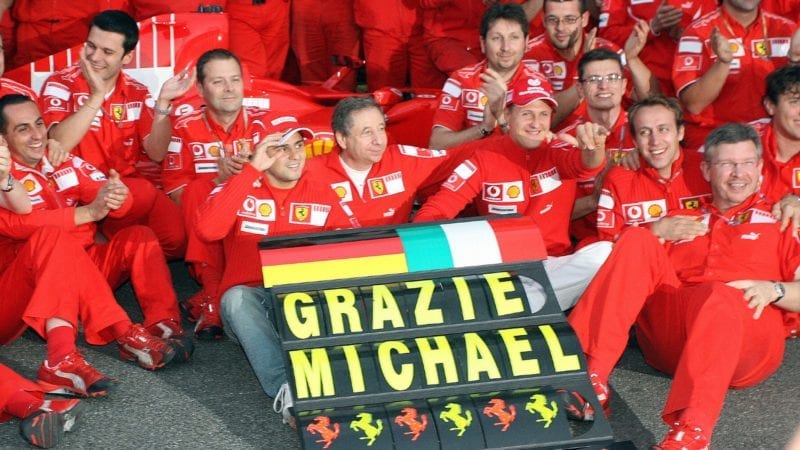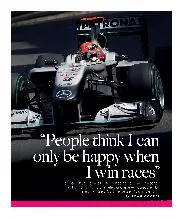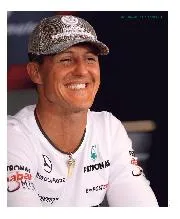Saturday dawns bright and warm. The Bridgestone boffins began sliding their temperature gauges into the asphalt. Meanwhile Sabine Kehm, Schumacher’s ever-smiling personal assistant, faces another day of telling all and sundry that she did not know exactly what Michael would be doing in the future and no, she did not think he would like to do an interview today, or tomorrow or even in the immediate future. Sabine exudes capability, standing firm in the scrum that constantly presses up against the fragile privacy of the Scuderia’s hospitality area with its red chairs and tables, red flowers and smart guests with tiny enamelled prancing horses on their jackets. She smiles a lot, defends the Schumacher corner politely and explains for the 78th time that her employer will speak again in the afternoon, same place, at about the same time. I ask, again, if the man might be ready to talk during the winter. “No, really, he will not do this,” Sabine repeats. “He will take some time away from racing and from the media.” I tell her that his manager Willi Weber says the man might consider an interview. But she’s better, quicker than that old ploy.
On track, it’s time for final practice, and Ferrari is ominously fast. Massa goes quickest with Michael next up. This is looking good for the man facing, yes, His Last Ever Grand Prix. A red front row looks almost certain and a quietly confident but strangely downbeat Ross Brawn joins the drivers for today’s mayhem-with-microphones behind the pits. You can just make out the red hats behind a quivering wall of cameras and tape recorders. “The car is very good,” the man says. “The tyres are working well. I have a good relationship with Felipe, we will do our best, we will race for the Constructors title. I don’t want to win with the others (Alonso) retiring. Let’s see what happens. I feel no different this weekend.” Really?
Into qualifying then, and the team leader bangs in a stunning 1.10.313 in Q2. Only he and Massa are below the 1.11 mark. Then all hell breaks loose. Out he zaps for Q3 and comes immediately back in, parks it, set upon by red overalls. There’s no fuel pressure. He will start 10th on the grid, with Massa on pole and Alonso fourth. All scripts are ripped up, in the bin. “Probably be one of those races,” remarks the veteran writer Alan Henry. “They’ll all drop out and a Toro Rosso will win.” This wry humour from a man who’s seen it all relieves some of the tension in our little enclave of a press room where every kind of outcome is being predicted, analysed and taken apart.
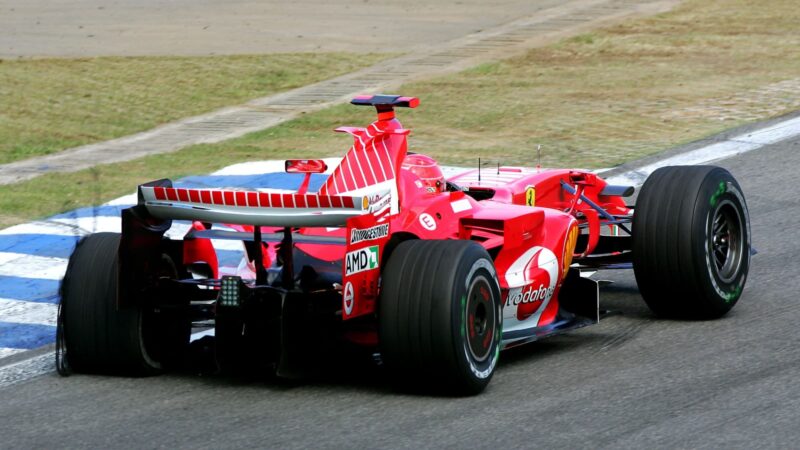
A puncture sent Schumacher down the order but he would fight back
Paul Gilham/Getty Images
How different from the retirement – the first one, that is –of Niki Lauda. Having won his first title in 1975, this most intriguing and intelligent of Austrians not only rose from the ashes of that dreadful shunt in ’76 but then won a second title a year later in 1977, again with Ferrari. So here’s a man who knows about Ferrari and about retirement. And none of us can forget the style in which he chose to walk away without a backward glance in 1979. Two years earlier he strode out of Ferrari, having announced his intentions before Monza and then, when his mechanic Ermanno Cuoghi was sacked, he just walked out with two races to go, the title in his pocket. He joined Brabham, had some good races in ’78, notably with the fan car, and then did his thing all over again. At the Canadian Grand Prix, with two races to run, he dumped his overalls and gloves in the pit, walked away and said he was off to start his own airline.
Hard to imagine this occurring in 21st century Formula 1, and even harder here in Brazil where Schumacher is playing out every last second of this highly emotional weekend, his every move scrutinised by a world which, excepting Alonso, is willing him to win this one last battle. If truth must be told, most wanted him to win the race and lose the championship. There are two camps when it comes to Schumacher, always have been. He’s aware of this, long ago sensing that the British media is not always marching to his tune.
Emotions ran high, too, when Alain Prost retired. On both occasions. The first one in 1991 came at the end of a terrible season with Ferrari that culminated in the Scuderia sacking the Frenchman after the Japanese GP on account of his criticism of the team structure. These were very different days at Maranello, and Prost failed to score a single win. He walked away from Suzuka an unhappy man. The second one came at the end of 1993, leaving as World Champion but embroiled still in open warfare with Senna, the FIA and the media. His arrival at Williams had sent Mansell packing and when, at Estoril in September, Prost discovered that Senna was to join Frank’s team for 1994 he announced his retirement. The next day he took the world title, finishing the race in second place less than a second behind… Michael Schumacher.
